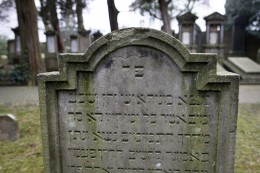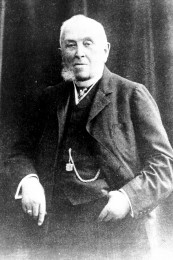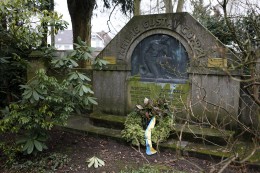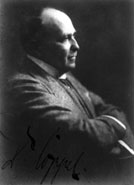
In 1770 the butcher and merchant Coppel Samuel came to Solingen from the Frankfurt area and married into the old-established family of Aaron Gerson. Together with his first wife Jette Aaron he had at least 7 children. The oldest gravestone at the Jewish cemetery refers to his second wife Sprinz Zaudy Hertz. After his children had adopted the hereditary family name of Coppel, a familiar form to Jakob, he called himself Samuel Coppel sen.
Together with Michel David Coppel Samuel bought a house in Südwall in 1787, which for 85 years was used as a school and a temple for the Solingen Jews. His eldest son Samuel Coppel founded a piece goods shop, which was carried on by his eldest son Aaron Coppel. In 1873 Aaron moved to Frankfurt with his family.
Coppel Samuel’s youngest son Alexander Coppel founded an own company in 1821, at first producing and selling piece goods, hard ware and steel ware. By the end of the 1860s a concentration on edge weapons took place, which soon made him to be one of the leading weapon manufacturer having worldwide business connections. Alexander Coppel involved the community to have a share in his success. They strongly supported the new building of the synagogue and enabled the erection of a school for workers, becoming the corner stone of a commercial and technical school in Solingen.

Especially Alexander’s son Gustav Coppel promoted the international trade of the company situated at Werwolf. While participating in the foundation of a stainless steel producing factory in Solingen he also erected a branch plant in Hilden producing precision steel tubes, competing with leading companies like Mannesmann.
Gustav Coppel held an important position in the economic, social and political life of Solingen. For a certain time he used to be president of the local chamber of commerce and chairman of different associations of manufacturers. For several years he presided over the local and district committee of the National Liberal Party, and from 1867 until 1910 he took the position of a town councilor, and from 1892 until 1914 the position as an unsalaried joint secretary, strongly committing himself to the development of a system of general and public education.

His social commitment highlighted in a charity foundation called the ‘Coppelstift’, which, starting in 1912, was devoted to youth and health welfare. For 60 years he took an active part in the executive board of the Jewish parish, 30 years of which he functioned as its chaiman. When the citizen of honour was carried to his grave in 1914 the condolescence of the population was overwhelming.
His sons led the family-owned company successfully through the war and economic crises. The 100th anniversary of the company’s existence they used as a special occasion to donate 2 Million Marks to several foundations.
The NS-regime put an end to the history of the Coppel family. In 1936 the Aryanisation of the company was enforced, the same as the conversion into an ltd. Gustav’s son Hermann had already died in 1931 and was the last one of the Coppel family to be buried at the Jewish cemetery. His eldest son Carl Gustav, living in Düsseldorf, and his wife also died shortly before the deportations started. Their two daughters were murdered.

The youngest son Alexander was wifeless. The curator of the ‘Coppelstift’ and former city councilor would be the last chairman of the Jewish parish. On July 21st, in 1942 he belonged to the last Solingen Jews being deported to Theresienstadt. Only a few weeks later he died of famine and exhaustion on August 5th at the age of 76.
For more than 100 years the ‘Coppelstift’ has ranked among Germany’s oldest advice centers for education. Today the historical buildings in Wupperstreet are home to organizations like family counselling, psychological counselling of schoolchildren, school social work, and the counselling of pregnant women in conflict situations.
A few years ago the City of Solingen named a Street after Alexander Coppel at ‘Südpark’. In 2007 a stumbling block was laid for him in front of ‘Werwolf 3’. In April 2015 the Solingen Comprehensive School took the decision that the school’s name should be changed into ‘Alexander-Coppel-Gesamtschule’.
After Wilhelm Bramann’s “Familie Coppel – dem Gemeinwohl verpflichtet” in Solinger Geschichtswerkstatt – Manfred Krause (Ed.) „… dass ich die Stätte des Glückes vor meinem Tode verlassen müsste“ – Beiträge zur Geschichte jüdischen Lebens in Solingen, Solingen 2000.
See also: Dr. jur. Alexander Coppel in “Schicksale 1933 – 1945”, Stadtarchiv Solingen